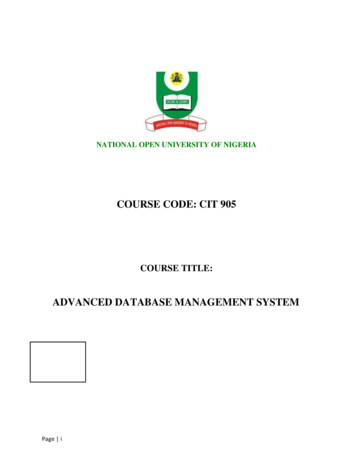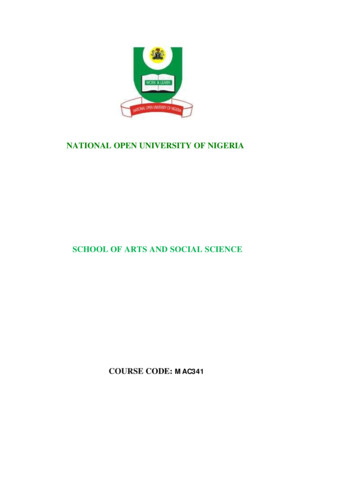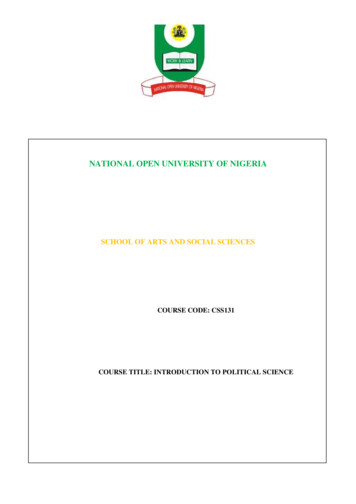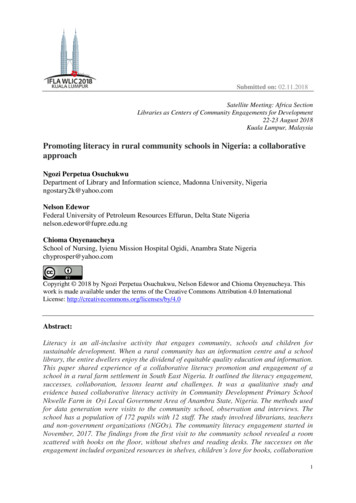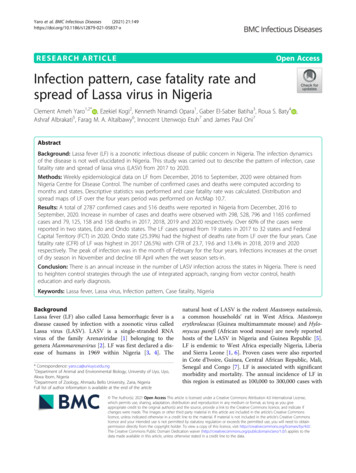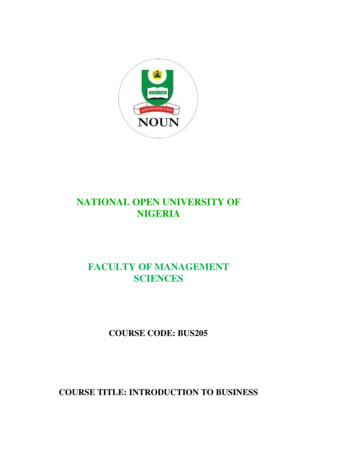
Transcription
NATIONAL OPEN UNIVERSITY OFNIGERIAFACULTY OF MANAGEMENTSCIENCESCOURSE CODE: BUS205COURSE TITLE: INTRODUCTION TO BUSINESS
BUS205INTRODUCTION TO BUSINESSCOURSEGUIDEBUS205INTRODUCTION TO BUSINESSCourse TeamCourse Developer/WritersHOD of AdministrationDr. Yemisi I. OgunlelaCourse CoordinatorMrs. Ihuoma Ikemba-EfughiKoce Henry DikoNational Open University of NigeriaNational Open University of NigeriaNATIONAL OPEN UNIVERSITY OF NIGERIAii
BUS205INTRODUCTION TO BUSINESSNational Open University of NigeriaHeadquarters14/16 Ahmadu Bello WayVictoria IslandLagosAbuja OfficeNo. 5 Dar es Salaam StreetOff Aminu Kano CrescentWuse II, AbujaNigeriae-mail: centralinfo@nou.edu.ngURL: www.nou.edu.ngPublished byNational Open University of NigeriaFirst Printed 2009ISBN: 978-058-187-1All Rights Reservediii
BUSS205INTRODUCTION TO BUSINESSCONTENTSPAGEIntroduction . . 1What You Will Learn in the Course . 1Course Aims . 1Course Objectives . 2Working through this Course . 2Course Materials . 2Study Units . 3Textbooks and References . 3Assignment File .3Assessment . 4Final Examination and Grading . . . 4Tutor-Marked Assignment . 4Course Marking Scheme 4How to Get the Most from this Course . 5Facilitators/Tutors and Tutorials 5Summary 6IntroductionBUS205 – Introduction to Business is a first semester, two credit course. Itis available for hundred (200) level students of B.Sc. BusinessAdministration. The course consist of 16 units, covering such generalareas as what business is, Business Environment, legal aspect of business,branches of business i.e. Marketing, Accounting, Human Resources, whoa consumer is etc.This course guide tells you briefly what the course is about, relevanttextbooks to consult, and how you can work, your way through thesematerials. It also contains some guidelines on your tutor-markedassignments.What You Will Learn in the Courseiv
BUS205INTRODUCTION TO BUSINESSBUS 205 – Introduction to business is an introduction in various coursesthat constitute business. Before graduation you are likely to specialize onareas like Marketing, Business Administration, Accounting, PublicAdministration, Entrepreneurship and small scale business, etc.It gives a general background of what all these courses are and how theyrelate to each other.Business is the life wire of any economy, you will learn about how toorganize people, use some business tactics to achieve a goal for anorganization.Course AimsThe course aim is to give you a broad framework of what business is allabout. At the end of the course, you should be able to decide to set up yourown business or join with others to set up a business and know the factorsto look at how to deal with them to succeed in your own business. Thiswill be achieved by aiming to:Introduce you to principles and concepts of business.Discuss the various types and kinds of businessDiscuss factors you will consider as a businessman.Demonstrate practically what constitute businessExplain how to use accounting to keep record.Explain how to use marketing to create customers for your company.Explain how to manage your human resources.Discuss other necessary factors of business that would aid you be onyour own.Course ObjectivesIn order to achieve the aims set out above; the course set overallobjectives. You will also realize that each course unit objectives arealways included at the beginning of each unit. It is advisable to readthrough their specific objectives before studying through the unit.The following are the broad objectives of the course. By striving to meetthese objectives, you should have achieved the aims of the course as awhole.On successful completion of the course, you should be able to:Describe the nature and scope of businessConcept of business and administrationv
BUS205INTRODUCTION TO BUSINESSExplain kind of businessesDiscuss types of businessesKnow who a consumer isExplain different business environmentDiscuss various legal issues in businessDiscuss the role of government in businessExplain the ethics and responsibilities of a businessDiscuss accounting in businessExplain what marketing is in the businessDescribe how communication helps in the businessAnalyze the roles on business concern.Discuss entrepreneurshipWho are the people involved in businessWhat has insurance got to do with businessWorking through this CourseIt will be very essential that you thoroughly read the study units, consultthe suggested texts and other relevant materials at your disposal. Most ofthe units contain Self- Assessment Exercise and Tutor-MarkedAssignment the later will be assessed by your tutor.Course MaterialsMajor components of the course are:(i)(ii)(iii)(iv)Course guideStudy unitsAssignment filePresentation scheduleStudy UnitsThere are 16 study units in this course; these are:Module 1Unit 1Unit 2Unit 3Unit 4Unit 5viWhat is Business?Concept of Business and AdministrationKind of Business – Sole TraderKind of Business – PartnershipKind of Business – Joint Stock Company
BUS205INTRODUCTION TO BUSINESSModule 2Unit 1Unit 2Unit 3Unit 4Unit 5Types of BusinessBusiness Environment – GeneralBusiness Environment – SpecificLegal Issues in Business – Sales of GoodsLegal Issues in Business – Law of ContractModule 3Unit 1Unit 2Unit 3Unit 4Unit 5Unit 6Social Responsibility of a Business and Business EthicsAccounting in BusinessMarketing in today‟s BusinessCommunication in BusinessEntrepreneurshipInsuranceTextbooks and ReferencesThere are no compulsory books for the course. However, you areencouraged to consult some of those listed for further reading at the end ofeach unit.Assignment FileThe assignment file will be made available to you. You will find all thedetails of the work you must submit to your tutor for marks. The marksyou obtain for this assignment will count towards the final mark you willobtain for this course.Any further information on assignment will be found in the assignmentfile.AssessmentYour performance in this course will be based on two major approaches.First, are the tutor-marked assignments (TMAs)The second method is through a written examination.Tutor-Marked Assignmentvii
BUS205INTRODUCTION TO BUSINESSWith respect to TMAs, you are expected to apply the information,knowledge and techniques gathered during the course or studying thismaterial. The assignment must be submitted to your tutor for formalassessment in accordance with the laid down rules.The total score obtain in the TMAs will account for 40% of your overallcourse markThere are many TMAs on the course you should subtract any eight to yourtutor for assessment. The highest four of the eight Assessments will becounted and this credited to your overall course mark.Final Examination and GradingAt the end of the course, you will need to sit for a final writtenexamination of two hours duration. This examination will be count for60% of your overall course mark. The examination will consist ofquestions which reflect the types of self-testing, practice exercises andTMAQs you have previously encountered. You are advised to prepareadequately for the examination. Since the general broad area of the coursewill be assessed.Course Marking SchemeThe following table lay out how the actual course marking is brokendown.ASSESSMENTEight assignment submittedFinal examinationTotalMARKSBest five assignment with 10marks each 50% of overall course marks50% of overall course marks100% of overall course marksHow to Get the Most from this CourseThe distance learning system of education is quite different from thetraditional University system. Here the study units replace the Universitylecturer, thus conferring a unique advantage to you.viii
BUS205INTRODUCTION TO BUSINESSFor instance, you can read and work through specially designed studymaterials at your own pace; and at a time and place that suit you best.Hence, instead of listening to a lecturer, all you need to do is reading.You should understand right from the onset that the contents of the courseare to be worked at and understand step by step, and not to be read like anovel. The best way is to read a unit quickly in order to see the generalaim of the content and then re -read it carefully, making sure that thecontent is understood step by step.You should be prepared at this stage to spend a very long time on someunits that may look difficult. A paper and pencil is a necessary piece ofequipment in your reading.Facilitators/Tutors and TutorialsDetailed information about the number of tutorial contact hours providedin support of this course will be communicated to you. You will also benotified of the dates, times and location of these tutorials, together with thename and phone number of your tutor, as soon as you are allocated to atutorial group.Your tutor will make and comment on your assignments, keep a closewatch on your progress and on any difficulties you might encounter, andprovide assistance to you during the course.Please do not hesitate to contact your tutor by telephone or e-mail if youneed help. The following might be circumstances in which you would findhelp necessary.You do not understand any part of the study unitsYou have difficulty with the self-tests or exercisesYou have a question or problem with an assignment or with thegrading of an assignment.You should endeavour to attend tutorial classes, since this is the onlyopportunity at your disposal to experience a physical and personal contactwith your tutor, and to ask questions, which are promptly answered.Before attending tutorial classes you are advised to thoroughly go throughthe study units and then prepare a question list. This will afford you theopportunity of participating very actively in the discussions.ix
BUS205INTRODUCTION TO BUSINESSSummaryOsuala 1986 summarizes everything about business; he says it plays animportant role in our lives. Business helps in job creations and producesgoods and services.Business includes those activities in which others endeavour to produceand to distribute the goods and services that are important to the wellbeing, comfort and happiness of individuals, and for the benefit of asociety as a whole.The owners of business are usually motivated in their activities not onlyby the need for the material contributions to the welfare of communities ofwhich they are a part, but also by the desire to make a profit.x
BUS205INTRODUCTION TO BUSINESSCourse Code/ TitleBUS205: Introduction to BusinessCourse TeamCourse Developer/WriterHOD of AdministrationKoce Henry DikoDr. Yemisi I. OgunlelaNational Open University of NigeriaCourse CoordinatorMrs Ihuoma Ikemba - EfughiNational Open University of NigeriaNATIONAL OPEN UNIVERSITY OF NIGERIAxi
BUSS205National Open University of NigeriaHeadquarters14/16 Ahmadu Bello WayVictoria IslandLagosAbuja OfficeNo. 5 Dar es Salaam StreetOff Aminu Kano CrescentWuse II, AbujaNigeriae-mail: centralinfo@nou.edu.ngURL: www.nou.edu.ngPublished byNational Open University of NigeriaFirst Printed 2009ISBN: 978-058-187-1All Rights ReservedxiiINTRODUCTION TO BUSINESS
BUS205INTRODUCTION TO BUSINESSCONTENTSPAGEModule 1 . . Unit 1Unit 2Unit 3Unit 4Unit 5Introduction to Business 1Concept of Business Management and Administration 10Kinds of Business (1) - Sole Trader . 19Kinds of Business - Partnership . 27Kind of Business - Joint Stock Company 34Module 2Unit 1Unit 2Unit 3Unit 4Unit 5Module 3Unit 1Unit 2Unit 3Unit 4Unit 5Unit 61 . . 41Types of Business 41Business Environment – General 48Business Environment – Specific 57Legal Issues on Business - Sales of Goods . 67Legal Issues in Business Law of Contract 75 . . 83Social Responsibility of Business .83Accounting in Business .89Marketing in Today‟s Business .98Communication in Business . 109Entrepreneurship 120Insurance 128xiii
BUS205INTRODUCTION TO BUSINESSMODULE 1Unit 1Unit 2Unit 3Unit 4Unit 5Introduction to BusinessConcept of Business Management and AdministrationKinds of Business (1) - Sole TraderKinds of Business - PartnershipKind of Business - Joint Stock CompanyUNIT 1INTRODUCTION TO bjectivesMain Content3.1What is Need and Want?3.2Making Choices3.3What is Business?3.3.1 Providing Goods and Services3.3.2 What Business does?3.3.3 Resources Business Use3.4Characteristics of Business3.5Objectives of Business3.6You and the Business World3.6.1 Your Role as a Consumer3.6.2 Your Role as a Wage Earner3.6.3 Your role as a citizen3.7Who Benefit from Business?3.7.1 Business Owners3.7.2 Employees3.7.3 Government3.7.4 General society3.8Business TermsConclusionSummaryTutor-Marked AssignmentReferences/Further Readings1.0INTRODUCTIONThis unit of introduction to business introduces you to the business world.It starts by telling you what need and wants are, how to make choices andwhat business does, its objectives and characteristics.1
BUS205INTRODUCTION TO BUSINESSThe study equally introduces you to your role as consumer, wage earnerand citizen. However, the unit gives you various definitions of businessand how you can benefit from it.2.0 OBJECTIVESAfter studying this unit, you should be able to:know what business isexplain your relationship with businessexplain the benefit you derive from businessterms of business.3.0MAIN CONTENT3.1What is Need and Want?You can‟t know what business is except you know some basic concepts.Wants - these are things you wish you could have for instance you wishto have a jeep car, a job in NNPC, to be a governor.Needs – these are necessities of life. You cannot do without them; theyinclude food, shelter and clothingYour needs and wants are translated into goods and services. Goods –they can be physically weight or measured e.g. bicycle. Services – aretasks that people or machine performs. For example, Adoctor attending to your health problem.You know that your resources are not enough to attend to all yourproblem. Resources mean anything you can use to value or obtain, whatyou need and want i.e. salary, influence etc.3.2Making ChoicesIn making your choice between the list of goods and services, it meansthat there is cost attach to it. For instance of you have N200 to buy either arecharge card or going to town to see a friend. If you decide to see a friendand not buying a card, then you have given up the later which is anopportunity cost. Opportunity cost could be in term of money or anotheritem.2
BUS205INTRODUCTION TO BUSINESSIn making your choices you attach value and goals to the goods andservices.The value differs from product to product. While your goal equallydetermine your choices of products.3.3What is Business?Brown et al (1997) says Business is all of the activities of an individual orgroup of individuals in producing and distributing goods and services tocustomers.Business wants to know your needs, wants, goals, values etc before theycan sell their goods to you.Business therefore is involved in the following activities.3.3.1 Producing Goods and ServicesBusiness provides goods and services to you. In today‟s business goodsand services are many.ExamplesGoods-HandsetClothComputerRadioHouse etcServices-EducationDoctor attending to youTraveling by airLodging in a hotel3.3.2 What a Business DoesA lot of activities happen before goods and services get to your door step.A product is not just made in a day and finds its way to the store. Theseare some of the activities that are performed by business.3
BUS205INTRODUCTION TO BUSINESSOrganising - within a company some one will be in charge to organizepeople and machines as to provide products.Manage - if there is no one to manage finance, human resources andproduction, the company can‟t go on smoothly.Production - it is the responsibility of a business to produce thosephysical item you are using i.e. radio, wrist watches etc.Marketing - business is involved in advertising, distributing and sellingthose products produced.3.3.3 Resources Business UseCompanies use resources to be able to perform those functions in 3.3.2and 3.3.1 above. We have told you what resources are. Resources thatbusiness will use include:--Human Resources - salesmen, accountants, manager.Materials - building offices, stores, raw materials for production.Business decides on choices of how to combine their resources and manymore everyday at what cost to achieve their aim.3.4Characteristics of BusinessBusiness has some of all of these characteristics:1.Exchange sale or transfer of goods and services. For every businessthere must be exchange of goods and services for money.2.Profit motive. For every business activities it is for profit making.But profitable organizations and some corporation they areestablished to provide services.Dealing in goods and services. For every organization that isbusiness oriented, it must produce goods and services (refer to3.3.1)Uncertainty and risk bearing. Every business undertaking must takerisk and there is always uncertainty. Uncertainty may arise as aresult of competition, wrong decisions unethical.Continuity and regularity. A business undertaking must always bein business and not on and off.3.4.5.4
BUS205INTRODUCTION TO BUSINESS3.5Objectives of Business1.2.Profit. The aim of an organization is to make profitSurvival. Every business must have as a goal to continue tosurvive or exist.Growth. A business must not only survive, but it must have asgoal to be the biggest.Market share. Every business concern must be able to carry out itsmarket share to control, aid sale its product to.Productivity. It must continue to produce.Innovation. Business must try to see that it‟s the first and best tobring up new ideas.Employee‟s welfare. Business must maximally want to take careof its workers.Service to consumer. Consumers are well satisfy as anotherobjective of any business concern.Social responsibility. Apart from doing 1-8 it must do to otherthings that people around the business must benefit.3.4.5.6.7.8.9.SELF ASSESSMENT EXERCISE1.List five characteristics of a businessi.ii.iii.iv.v.2.List five objectives or goals of a business.i.ii.iii.iv.v.3.6You and the Business WorldDirectly or indirectly, you affect a business. Have you ever heard someonesaying, who becomes Nigerian president or my state governor I don‟t care.I want to believe, it is out of ignorance he is saying so. If a companyproduces soft drink in your locality, your decision to buy or not to buy hasan effect on the business.If you decide not buy any product, you have made business decision. Youas a consumer, citizen or a wage earner, business and you have arelationship.5
BUS205INTRODUCTION TO BUSINESS3.6.1 Your Role as a ConsumerConsumers are always referred to as a king. If you make purchases of acompany‟s product you are telling the company that you like theircompany. If you continue to buy, you increase the company‟ profit.If you don‟t buy a company‟s product, the company can stop productionand fold up to relocate.Your role as a consumer is to continue to patronize the company so thatthe company can grow.3.6.2 Your Role as a Wage EarnerAs a wage earner you earn some income, there is need for you to developyour career. Your thinking is what you will get and what will be yourcontribution.As a wage earner, you may want to gain-RecognitionRespectA great deal of moneyYour contribution to the business will be dependent on the followingfactors-SkillsJob marketPersonalityYour interestAs a wage earner, you have a great deal to contribute to a business.3.6.3 Your Role as a CitizenAs a citizen the first in mind is that I will be law abiding, pay my tax. Alot of you have forgotten that you are suppose to participate in running ofgovernment and make important policy decision affecting the public.The people you elect into leadership position affects business activities ofa country.Obasanjo‟s government brought in privatization, commercialization,liberalization etc.6
BUS205INTRODUCTION TO BUSINESSBrown et al (1997) concluded that business plays an important role in yourlife today and will play an increasingly important role in the future.Likewise, you affect what business does now and will do in the future. Itsimportant to know business tricks and how you can relate to the businessworld.3.7Who Benefits from a Business?Business as we now include production of goods and service thoseconsumers want. Business try‟s to find out what is good for the consumer,so that businesses will reach out to each other. Because of these, businessproduce goods and services not only quality goods, they do the followingto benefit others.3.7.1 Business OwnersBusinesses owners are proud to be there own owners of business i.e.there is satisfaction of being their own boss.Income comes into the business owner‟s hands. There is equally anopportunity to grow.3.7.2 EmployeesWorkers are paid salaries. It therefore means you earn an income thatenable you attend to your own personal problems like building a house,buying a car. It enables you as a worker to make choice of what to buy.Employee‟s benefit from business training opportunity. Business enablesyou to gain on the job experience about the job. After that you canestablish a business on your own.Business could send you for training outside the organization and gainexperience, which could lead you to getting another job outside theorganization.Employees gain from business other benefits like health insurance,retirement plan, sick and vacation leave etc.3.7.3 GovernmentThe basic thing that government gains from business is tax. Business paysvarious taxes to government, which enables government to provide otherservices to the general public.7
BUS205INTRODUCTION TO BUSINESS3.7.4 General SocietyWhether you patronize a business or not these days, you are likely tobenefit from business. Business provides to the general public what wecall social responsibility. For instance MTN provide computer centers tosome secondary schools in Nigeria.Businesses build schools in some countries to operate on. These are someof the social responsibilities that the general society benefits frombusinesses.General public has started benefiting from business producing friendlyproducts. In the US it is referred to as Green product i.e. environmentallyfriendly product i.e. non-toxic and non-polluting clean products. Ozonelayer friendly product i.e.3.8 Business TermsSome of these terms are mostly used in business:1.2.3.4.5.Business enterprises. There is the sum total of business activitiesthat have creation, maintenance, expansion of a corner which am toexist for a profit.Business form. A business firm is an economic unit, entity ororganization.Industry. Consists of a number of firms.Commerce. It is made up of trade and all activities that make tradepossible.Trade. It refers to the sale, transfer or exchange of goods andservices and constitute the central activity armed with the auxiliaryfunction i.e. banks, transportation etc. It is the exchange of goodsand services for money or other goods.SELF ASSESSMENT EXERCISE1.Define wants, needs, goods, services and resources with examples.2.What costs do you encounter when you give up one choice infavour of another? Give practical example.4.0CONCLUSIONYou have learnt in this unit what business is, its function and its benefit toall and the society. Business therefore is how to better the life of all withina given society by providing them with qualitative goods and services.8
BUS2055.0INTRODUCTION TO BUSINESSSUMMARYBusiness activities include how to identify your needs and wants and makechoices among the numerous options. As a consumer you have an effecton any services whether you patronize them or not.Both government, consumer, general public benefit from a businessconcern once the location is within their territory.6.0TUTOR-MARKED ASSIGNMENTWhat is Business? What are the benefits that can be derived from abusiness?7.0REFERENCES/FURTHER READINGSBetty I. Brown and John E. Clon (1997). Introduction to Business, OurBusiness and Economic World. New York: McGraw Hill Inc.9
BUS205INTRODUCTION TO BUSINESSUNIT 2CONCEPT OF BUSINESS MANAGEMENT oductionObjectivesMain Content3.1 Differentiate between Business Administration andManagement3.2 Comparism between Management and Administration3.3Administrative Organisation3.3.1 Types of Administrative Organization3.4 Types and Functions of Management3.4.1 Scope of management3.5 Evolution and Development of Management Theories3.5.1 Classical Theories of Management3.5.2 Behavioural Theories of Management3.5.3 Management Science3.5.4 System ApproachConclusionSummaryTutor-Marked AssignmentReferences/Further Readings1.0INTRODUCTIONThe unit of Business Management concept and administration, introduceyou to the basic origin of business administration and management. Someearly contributors to the theory of management as discuss. Discussion ontypes of management.2.0OBJECTIVESAfter studying this unit, you should be able to:differentiate between administration and managementknow the evolution and function of managementknow some theories of management.10
BUS205INTRODUCTION TO BUSINESS3.0MAIN CONTENT3.1Differentiate Between Business Administration andManagementDictionary of management, by Hartzell (2006) say this about BusinessAdministration and Management.The terms management and administration have been used by differentmanagement authorities in a manner that sometimes they seem to be oneand the same while at some other time; they diverge. According to most ofthe modern writers like Fayol, Koountz, Alleri and Perry, there is no realdistinction between the two terms. Fayol for instance stated “Allunderstandings require planning, organization, command, coordinationand control and in order to function properly, all must observe to somegeneral principles, we are no longer confronted with several administrativesciences but with one which can be applied equally well to public andprivate affairs”.3.2Comparison between Administration and ManagementHartzell (2006) has differentiated administration and management asfollows:1.2.3.4.5.3.3Administration is main functions include the formulation of broadobjectives, plans and policies where as the main function of themanagement are getting the work done through others in order toachieve the set goals.Administration is basically a policy and decision-making functionwhile the management is an executive function.Administration decides what is to be done and when it is to be donewhereas the management decides who has to do it and how.Administration is important at the top levels of managementwhereas the management is more important at middle levels.The term administration is commonly used for non-businessinstitutions whereas the term management is used to businessenterprises.Administrative OrganisationIt can be define as an organization in which the jobs or functions to becarried out are clearly defined in order to achieve the target. Theresponsibilities and authorities at various levels of managerial positionsare clearly defined. Hartzell (2000).11
BUS205INTRODUCTION TO BUSINESS3.3.1 Types of Administrative OrganizationYou can classify administrative organization into three:1.LINE ORGANIZATIONThis is the type of organization that you have direct authority over yourrespective subordinates through chain of command. All the managers havefull authority to decide and act with respect to their area of functioning.PresidentV.P ProductionMaintenanceServiceForeman2.ForemanLINE AND STAFF ORGANIZATIONIn this type of organizations, there are two type of authority relationshipsi.e. true authority and advising authority co-exist most of the managershave line authority to decide and act as in a line organization. However,there are some positions where job is of advisory and supportive nature.Some of the examples are personnel managers, company secretary.3.FUNCTIONAL ORGANIZATIONSIt is define as an organization in which line authority, staff authority andfunctional authority exist together. A functional authority is a limited formof line authority given to functional experts over certain specializedactivities under the normal supervision of managers belonging to otherdepartment e.g. if personnel policies are observed in all the departmentsthrough out the organization. Harztell (2006).12
BUS2053.4INTRODUCTION TO BUSINESSTypes and Function of ManagementManagement type can be classified according to-level of responsibility andrange of activities they are responsible to.They are classified as:-Junior or First-Line Management - These are set of managers ata lower level, they are in charge of other workers. Example ofjunior manager is a foreman who is in charge of builders, seniordriver in charge of other drivers.-Senior Management - You take titles like Chairman, ManagingDirector, Chief Executive, Rector, Vice Chancellor, etc. They arecharge with a lot of responsibilities which include strategyformulations.3.4.1 Scope of ManagementWilkson et al (1994) sees a functional manager as responsible only for asingle area of activity, such as production, finance or personnel. A generalmanager, by contrast, is responsible for many activities.3.5Evolution and Development of Management TheoryBefore now human beings were leaving on their own, the history of barteris still fresh in your memory. People were operating in groups; this cameas a result of the extension of family and tribes.As the society develops, and things become more complex, there
National Open University of Nigeria Headquarters 14/16 Ahmadu Bello Way Victoria Island Lagos Abuja Office No. 5 Dar es Salaam Street Off Aminu Kano Crescent Wuse II, Abuja Nigeria e-mail: centralinfo@nou.edu.ng URL: www.nou.edu.ng Published by National Open University of Nigeria First Printed 2009
